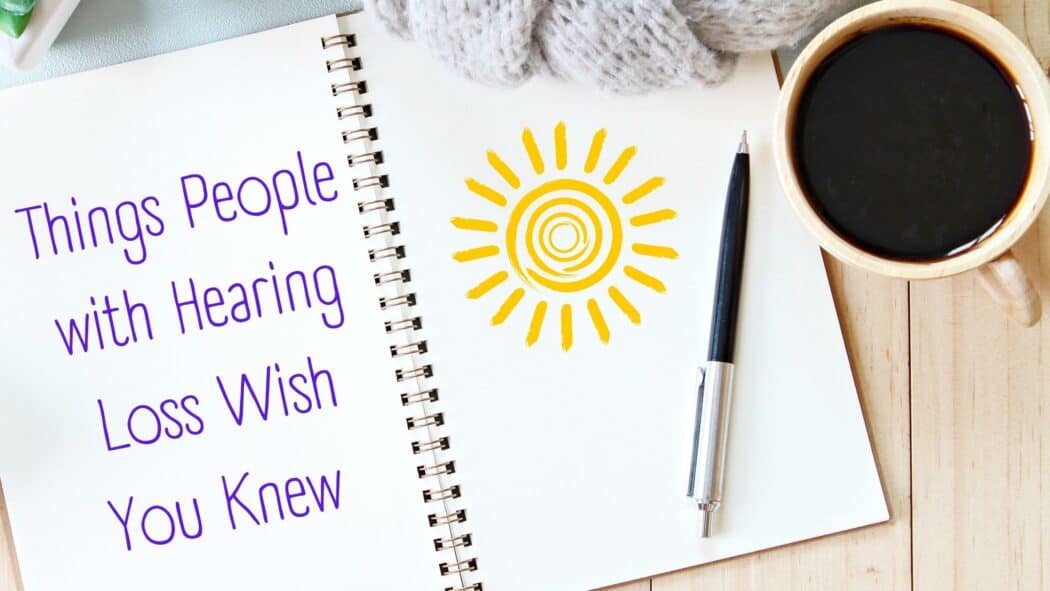Hearing loss can be an isolating experience. It keeps you from hearing the people around you and hinders your ability to respond. At first this might not seem like a big deal but as years continue, hearing loss causes strains on relationships, affecting self-esteem and instigating chronic depression. The truth is, if people with normal hearing understood what it is like to have hearing loss they might be able to make some accommodations to communicate with the hearing impaired people in their life with more ease. Hearing loss is not ideal but there are several actions you can take to make conversation a much more pleasant experience. Here are just a few things people with hearing loss wish you knew.
When hearing abilities begin to deteriorate, it is common for people to rely on visual cues. This includes nonverbal cues in conversation such as lip reading, body language and facial expression. When speaking to someone with a hearing disability, make sure to face them. This allows full view of the face and adds many more contextual information that may be lost due to hearing issues. Avoid speaking from another room as it is possible for the entire content to be lost to the listener.
Volume does not equal clarity
It is common when first learning that someone has a hearing loss to increase the volume in your voice in order to help that person hear. While you may be trying to be helpful it certainly is not. Shouting distorts the sound making it more confusing to hear. In addition, it changes the shape of your lips which confuses those of us who rely on lip reading. Instead of shouting, try slowing down. When you speak evenly and clearly pronounce each sound it gives people with hearing loss time to comprehend what you are saying and enough time to respond appropriately. Try adding a pause at the end of a sentence as this adds extra time to process information.
Grab our attention first
It is helpful if someone with hearing loss can have a moment to prepare to listen. Make sure you have eye contact with a person when speaking to them. This can let you know they are engaged and following. You could start by saying their name first or even tapping them on the shoulder if appropriate. The more time a person with hearing loss has to prepare to listen the more likely they will be prepared to follow what you are trying to say.
Choose location wisely
It can be a challenge to hear amongst the noise for anyone. However, for many with hearing loss, this is an extreme challenge. Many types of hearing loss make it difficult to prioritize sounds in crowded or noisy environments. This means that the person with hearing loss may have to ask for repetition or simply choose to pretend to hear. This can add to isolation and loss of connection in social situations. If you are trying to spend quality time with someone with a hearing loss, it’s kind to consider the environment. If it seems too noisy it most likely is. If eating at a restaurant try visiting off peak hours or make sure to sit in an area with the least amount of competing noise. When in an environment where you can control the noise more, turn down the stereo and wait to run noisy appliances later.
Repetition
If the person with hearing loss has to ask “what” more than twice, try rephrasing the statement rather than repeating it again. It is likely that just one word may be the culprit. Asking the person what the word is they are struggling with can help you identify and find a synonym for that word.
Hearing aids don’t work like hearing aids
When first putting on a pair of prescription glasses, the user’s vision will instantaneously be corrected. Hearing aids don’t work like that. These amazing electronic devices are able to amplify the specific sounds you struggle with making it easier to hear the people in your life and enhance your environment. However, it takes time to get used to wearing them. Often people have gone years with hearing loss before they finally try hearing aids for the first time. That is a lot of new sounds to get used to hearing. It takes time to get used to hearing aids and they work best when you wear them every day. However, with practice and dedication, these amazing devices can improve the connections we have with sound in everyday life.
If you think you could benefit from hearing aids, schedule a hearing test today. We’re here to help! We look forward to hearing from you.

